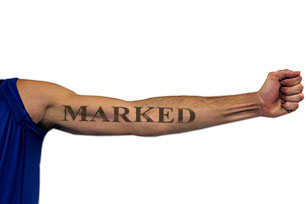“Getting my tattoo hurt so badly. It felt like getting a third degree burn,” Senior Austin Markley said, as he describes what it felt like to get his tattoo.
Markley’s tattoo is on the back of his leg and shows the initials of the men in his family on his dad’s side.
“I wanted to get a tattoo that meant something,” he said.
While many students have gotten or want to get a tattoo, JC has policies regarding body ink that can deter them from getting one.
“We’re not enforcing not having the tattoos, we’re enforcing not having them visible,” Dean of Students Thomas Vierheller said. “We’re not a zero tolerance school. This also applies to piercings as well.”
According to the school handbook, male students cannot have piercings, and female students are only allowed ear piercings.
“We ran into problems with boys getting piercings in the middle of the school year,” Vierheller said. “If boys have ear piercings, they have to cover them up. If a boy gets his ear pierced, it’s not catastrophic. It’s kind of like, ‘okay fine, you’ve got these holes in your head.’ ”
“Most students aren’t eighteen, which means their parents gave them permission,” Vierheller said. “It’s a balance between keeping parents not upset and students not upset and still enforcing the rules.”
Markley’s parents did give him permission. In fact, his mom went with him about a month and a half ago. “I had been waiting to get my tattoo for quite some time, and finally one day my mom told me we were leaving to get my tattoo, and I got it,” Markley said.
“I have a tattoo of a friend’s name that I got about two months ago. I lost a bet with them so I had to get their name tattooed,” senior Sammy Clough said. Clough also has his ears pierced. “I don’t like the rules that say that guys can’t show their ear piercings. It’s kind of a pain to have to cover them up every day.”
Junior Emily Kennedy also has piercings and would like more.
“I have 10 piercings in my ears and my belly button. I recently got my nose pierced too, but had to take it out for school and work,” Kennedy said. “I’ve always liked piercings because I think they’re a different and unique way to express yourself and they look really cool.”
However, students aren’t the only ones with tattoos. Social studies teacher Jake Hollin has one as well.
“My tattoo is of a Celtic cross. It’s a significant reminder about what’s important,” Hollin said.
Like Hollin, Physics teacher Jorge Piquer believes his tattoo is meaningful to him. “I’m named after St. George and he’s the ‘dragon slayer,’ which is why I have a tattoo of a dragon,” Piquer said.
Some students do not have tattoos, but are planning on it in the future, including sophomore Charlotte Molali.
“I want to get tattoos that are symbolic to me. As long as students have tattoos that aren’t showing in the uniform, then it should be fine,” Molali said.
There are a variety of opinions on the rules regarding tattoos and piercings.
“The rules are fine, because you want to look clean,” Markley said.
Kennedy agrees that the rules are reasonable, but would like the school to allow piercings other than just earrings.
“I think the rules at JC are obviously understandable, since we are a private Catholic school and they want everyone to look professional and clean cut,” Kennedy said. “I do personally wish we could have a little more leniency in that area to maybe allow students to have nose piercings or something like that.”
Sophomore Brian Chalmers thinks the rules are unfair to male students.
“I don’t like the rules,” Chalmers said. “Girls can wear piercings, so guys should be able to.”
Social studies teacher Rodney Johnson believes the rules should be enforced.
“The handbook says what the handbook says. If a kid has earrings, we can just tell them to take them out, but if a student has a tattoo, what can we do for enforcement? It’s easier to not have to deal with it than to deal with the confrontation,” Johnson said. “When I first started working here in 1995, students having earrings and tattoos weren’t even an issue. Tattoos and piercings have become more common than they were twenty years ago.”
“It’s a constant battle with these things. Getting tattoos and piercings are the adolescents’ ways of ‘pushing the edge’ and if that’s ‘pushing the edge,’ then we’re doing okay,” Vierheller said. “The rule that’s most important to students is fairness. We try our best to treat students with dignity in a way that we can reach them.”
Nicole Arrison is a Reporter for The Patriot and jcpatriot.com.



